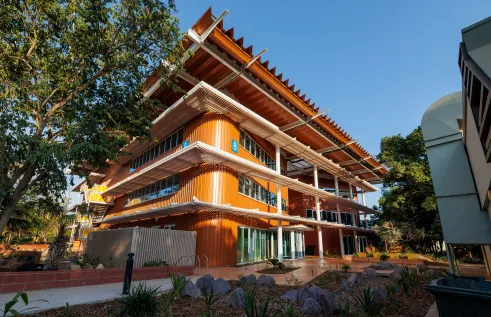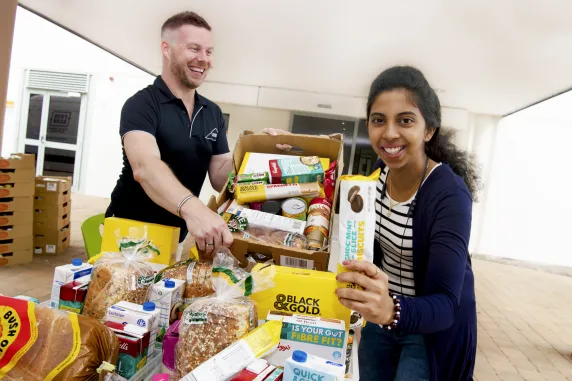news article
Emergency food parcels help students in time of need
Charles Darwin University students and staff have provided more than 3600 emergency student food parcels during the past three months to assist students across the NT who have been experiencing financial hardship during the COVID-19 pandemic.
The CDU Emergency Student Food Parcel program was made possible through the generous support of the Charles Darwin University Foundation, Newmont Australia and Foodbank NT, with a group of international students coming together to say “thank you” for the support.
CDU advancement officer David MacBain said the food program had taken a considerable amount of coordination.
“We’ve had many staff and students who have volunteered to assist us with packing the food hampers … it was a mammoth task, and we were overwhelmed by the number of people who wanted to help,” he said.
“The students have been incredibly grateful for the support that they have received.”
The program ran for 14 weeks with 3644 parcels provided to domestic and international students.
Distribution centres based on CDU’s Casuarina and Palmerston campuses, as well as Foodbank NT’s warehouse in Berrimah ran every Friday, while additional larger parcels were freighted to Tennant Creek and Alice and Springs each fortnight.
Mr MacBain said it was pleasing to see the program had made an immense impact on CDU’s student population.
“When the pandemic first hit and everything went into lockdown, there were severe shortages of groceries at supermarkets,” he said. “The food parcels were a way for us to provide immediate assistance to our students and provide them with a sense of security.”
Mr MacBain, who helped at the Casuarina distribution centre from week one, said he saw first-hand just how incredibly concerned our students were about what was going to happen.
“Over the weeks this has changed and now when they come along, a lot of them have a smile on their face which is quite uplifting to see,” he said.
“It wasn’t just about providing the food parcels, but also taking the time to have a chat with them in person each week and see how they are going.”
Related Articles

2000 students filter into $30.8 million health teaching and training facility
More than 2000 students from 10 health disciplines are set to filter into Charles Darwin University’s (CDU) newly-completed $30.8 million Centre for Better Health Futures throughout 2026.
Read more about 2000 students filter into $30.8 million health teaching and training facility
First “hype cycle” of AI development put tech above humans
Users around the world have rushed to adopt artificial intelligence - especially in safety-critical fields - but a new study has revealed the hype has prioritised technology for technology’s sake instead of human-centred development.
Read more about First “hype cycle” of AI development put tech above humans
Nanoplastics hindering cognitive abilities of fish, international research shows
Nanoplastic exposure can impair the cognitive abilities of fish and could lead to significant impacts on marine species’ ability to survive, according to a new international study.
Read more about Nanoplastics hindering cognitive abilities of fish, international research shows
